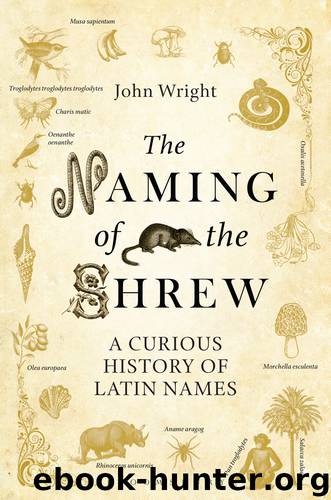The Naming of the Shrew by John Wright

Author:John Wright
Language: eng
Format: epub
Publisher: Bloomsbury Publishing
Published: 2014-09-30T16:00:00+00:00
Equisetum palustre brevioribus foliis polyspermon
Chapter VI
The History of Naming
And out of the ground the LORD God formed every beast of the field, and every fowl of the air; and brought them unto Adam to see what he would call them: and whatsoever Adam called every living creature, that was the name thereof. And Adam gave names to all cattle, and to the fowl of the air, and to every beast of the field. Genesis 2:19, 20
Despite the jealous claim of one notorious occupation, it can be forcefully argued that taxonomy is the oldest profession. The irascible God of the Old Testament took a poor view of humankind, His commands largely being those of proscription rather than prescription. But one thing he did ask us to do, in fact the very first thing he ever spoke to us about in the Garden of Eden, was to name the animals.
God is merciful, so it is said, and it is perhaps for this reason that, while asking Adam to provide the animals with names, he did not require him to put them in any order. Yet the list he gave to Adam – cattle, fowl and beasts of the field – hints at a kind of order, a folk taxonomy that would work for all time at a practical level and that would serve as the only taxonomic paradigm for generations. It was rather restricted, but the one thing its creatures have in common is that they are edible. Pragmatism was (and, with folk taxonomies, still is) everything when it came to classification and, with a handful of classical exceptions, it dominated until the Renaissance.
Finding the true order (see here) of the living world was of little practical use until modern times. Fennel (Foeniculum vulgare) is an excellent accompaniment to fish and calms the stomach; hemlock water-dropwort (Oenanthe crocata) tastes awful and will have you dead in three hours. That is enough information for most people; the fact that both are members of the family Apiaceae and thus closely related is of no particular concern. Classifying organisms according to utility is no more scientific than putting them in alphabetical order, but both are at least some sort of order. The search for the true order would fall to Adam’s descendants many millennia later.
In their endless struggle to avoid the tragic end of the Dodo and countless millions of other ill-fated species, all animals are equipped with a sense of the order of the world in which they find themselves. For anything above the size of an amoeba (and maybe even for them), fellow organisms may be categorised simply enough: the good, the bad and the indifferent. That is, things that you can eat, decorate your nest with, shelter under, use to cure a headache; things that will eat you, poison you or bring you out in a nasty rash; and, so much less interesting, everything else.
One would hope that such considerations were largely beneath civilised modern man, who should appreciate organisms for their beauty or scientific interest, but it is not really so.
Download
This site does not store any files on its server. We only index and link to content provided by other sites. Please contact the content providers to delete copyright contents if any and email us, we'll remove relevant links or contents immediately.
| Cacti & Succulents | Flowers |
| Mushrooms | Trees |
Sapiens: A Brief History of Humankind by Yuval Noah Harari(14371)
The Tidewater Tales by John Barth(12653)
Mastermind: How to Think Like Sherlock Holmes by Maria Konnikova(7324)
Do No Harm Stories of Life, Death and Brain Surgery by Henry Marsh(6938)
The Thirst by Nesbo Jo(6932)
Why We Sleep: Unlocking the Power of Sleep and Dreams by Matthew Walker(6706)
Life 3.0: Being Human in the Age of Artificial Intelligence by Tegmark Max(5549)
Sapiens by Yuval Noah Harari(5366)
The Body: A Guide for Occupants by Bill Bryson(5082)
The Longevity Diet by Valter Longo(5058)
The Rules Do Not Apply by Ariel Levy(4957)
The Immortal Life of Henrietta Lacks by Rebecca Skloot(4581)
Animal Frequency by Melissa Alvarez(4463)
Why We Sleep by Matthew Walker(4435)
The Hacking of the American Mind by Robert H. Lustig(4375)
Yoga Anatomy by Kaminoff Leslie(4358)
All Creatures Great and Small by James Herriot(4311)
Double Down (Diary of a Wimpy Kid Book 11) by Jeff Kinney(4261)
Embedded Programming with Modern C++ Cookbook by Igor Viarheichyk(4173)
